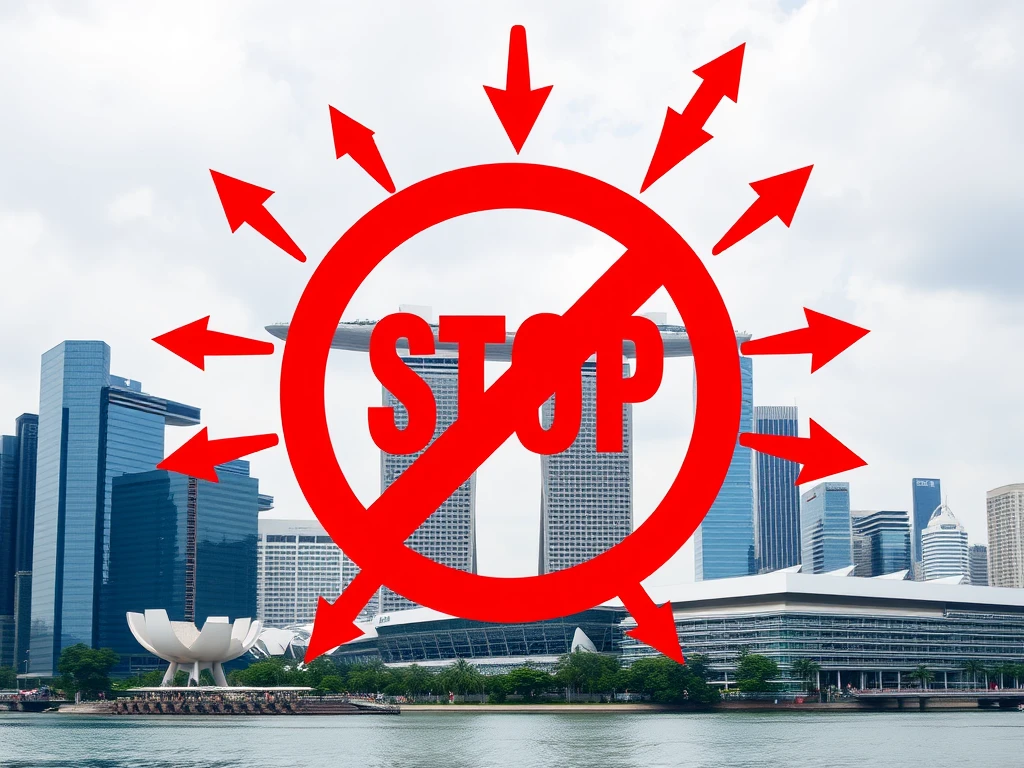Urgent: Singapore Crypto Firms Face Strict June 30 Deadline for Overseas Operations

Singapore, a prominent hub for digital assets, is implementing significant changes to its regulatory landscape. A new directive under the FSM Act Singapore requires local crypto firms to cease certain crypto overseas operations by June 30. This move signals a tightening of Singapore crypto regulation, impacting firms targeting markets outside the city-state.
What Does the New MAS Crypto Directive Mean?
The Monetary Authority of Singapore (MAS crypto) has set a clear deadline: June 30. Local providers of digital token (DT) services must stop offering these services to overseas markets if they are not already licensed under specific existing financial laws. This directive is part of MAS’s response to industry feedback on the regulatory framework for Digital Token Service Providers (DTSPs) under the Financial Services and Markets Act of 2022 (FSM Act).
Key points from the MAS directive:
- No transitional arrangements for local DTSPs providing services abroad.
- Singapore-incorporated companies, individuals, or partnerships providing DT services outside Singapore must cease operations or obtain a license by the end of June.
- The requirement falls under Section 137 of the FSM Act.
Who is Affected by Singapore’s Crypto Regulation?
This new phase of Singapore crypto regulation primarily targets Singapore-based entities whose digital token activities reach international customers. This applies even if their overseas token-related activities are not their primary business. Section 137 of the FSM Act Singapore presumes that businesses operating from Singapore are subject to these licensing requirements.
Penalties for Non-Compliance with the FSM Act Singapore
The consequences for firms failing to comply with the June 30 deadline and the FSM Act Singapore provisions are severe. Violators face significant penalties:
- Fines of up to 250,000 Singaporean dollars (approximately $200,000 USD).
- Imprisonment of up to three years.
These steep penalties underscore the seriousness with which MAS views compliance with the new MAS crypto rules.
Are There Exceptions or Ways to Get a Singapore Crypto License?
Only firms already licensed or exempted under existing financial laws—the Securities and Futures Act, Financial Advisers Act, or Payment Services Act—may continue operating without conflict. For firms seeking a new Singapore crypto license specifically under the new DTSP framework for overseas operations, the path appears challenging.
According to Hagen Rooke, a Partner at Gibson, Dunn & Crutcher, obtaining a new license for this type of operating model will be rare. He noted in a LinkedIn post that MAS is likely to grant licenses only in extremely limited circumstances due to heightened regulatory concerns, particularly around Anti-Money Laundering (AML) and Counter-Terrorist Financing (CFT).
Why is Singapore Tightening Oversight on Crypto Overseas Operations?
The stricter stance on crypto overseas operations stems from Singapore’s broader efforts to address risks in the digital asset sector and close regulatory gaps. The FSM Act Singapore, passed in April 2022, granted MAS greater authority to regulate crypto firms based in Singapore, even if their services are offered outside the country.
MAS expressed concerns that firms could register in Singapore while conducting unregulated activities abroad, potentially exploiting regulatory arbitrage. The requirement for DTSPs with overseas operations to comply with AML and CFT standards, even without offering services within Singapore, is a direct response to these concerns.
This move highlights Singapore’s commitment to maintaining its reputation as a well-regulated financial center, extending its oversight to prevent the misuse of its jurisdiction for illicit activities conducted through crypto overseas operations.
Actionable Insight: What Should Singapore Crypto Firms Do Now?
Given the strict deadline and the difficulty in obtaining new licenses for overseas-focused models, legal experts urge companies to take swift action. Operational restructuring to remove Singapore touchpoints for their overseas activities is a key strategy to de-risk and ensure compliance with the new Singapore crypto regulation.
Summary: Navigating the New Era of Singapore Crypto Regulation
Singapore’s mandate for local crypto firms to halt crypto overseas operations by June 30 marks a significant shift. Driven by AML/CFT concerns and the need to prevent regulatory arbitrage under the FSM Act Singapore, this move reinforces the stringent nature of Singapore crypto regulation. Firms must act quickly to comply or face substantial penalties. While obtaining a new Singapore crypto license for such activities is expected to be challenging, understanding the new rules and restructuring operations are critical steps for businesses navigating this evolving regulatory landscape under the watchful eye of MAS crypto oversight.







